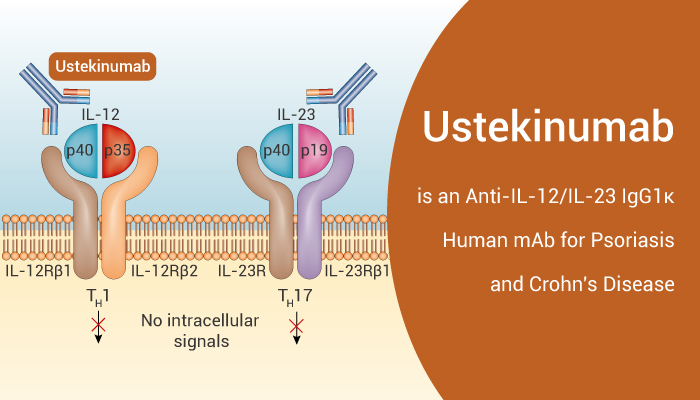Interleukins are a group of cytokines (secreted proteins and signaling molecules) that were first seen to be expressed by white blood cells (leukocytes). The majority of interleukins are synthesized by helper CD4 T lymphocytes, as well as through monocytes, macrophages, and endothelial cells. They promote the development and differentiation of T and B lymphocytes, and hematopoietic cells. Among them, interleukin 12 (IL-12) is an interleukin that is naturally produced by dendritic cells, macrophages, neutrophils, and human B-lymphoblastoid cells (NC-37) in response to antigenic stimulation. IL-12 is a heterodimeric cytokine encoded by two separate genes, IL-12A (p35) and IL-12B (p40). IL-12 is involved in the differentiation of naive T cells into Th1 cells. In addition, IL-12 plays an important role in the activities of natural killer cells and T lymphocytes. IL-12 also has anti-angiogenic activity.
Furthmore, IL-23 is a heterodimeric cytokine composed of an IL-12B (IL-12p40) subunit (which is shared with IL-12) and an IL-23A (IL-23p19) subunit. IL-23 is an inflammatory cytokine. IL-23 is mainly secreted by activated dendritic cells, macrophages or monocytes. Innate lymphoid cells and γδ T cells also produce IL-23.

Ustekinumab (also known as Anti-Human IL-12/IL-23, Human Antibody) is an anti-IL-12/IL-23 p40 subunit IgG1κ human monoclonal antibody.
Ustekinumab has variable heavy and light chain domains of the VH5 and Vκ1D germ-line families. Importantly, Ustekinumab prevents human IL-12 and IL-23 from binding to the IL-12Rβ1 receptor chain of IL-12 (IL-12Rβ1/β2) and IL-23 (IL-12Rβ1/23R) receptor complexes on the surface of natural killer cells and T-cells. At the same time, Ustekinumab does not bind to mouse IL-12 and IL-23. In addition, Ustekinumab is generated using human Ig transgenic mice with four distinct genetic modifications that replaced the mouse Ig loci with human antibody transgenes. Moreover, in vitro, Ustekinumab blocks responses mediated by IL-12 and IL-23 equally. Besides, Ustekinumab has been investigated in four indications, ie, psoriasis, psoriatic arthritis, Crohn’s disease, and multiple sclerosis.
To sum up, Ustekinumab is an anti-IL-12/IL-23 p40 subunit IgG1κ human monoclonal antibody, has the potential for psoriasis, psoriatic arthritis, Crohn’s disease, and multiple sclerosis research.
References:
[1] Monica Montepaone, et al. Open Access Rheumatol. 2014 Feb 20:6:7-13.
[2] Angela Schoch, et al. Proc Natl Acad Sci U S A. 2015 May 12;112(19):5997-6002.